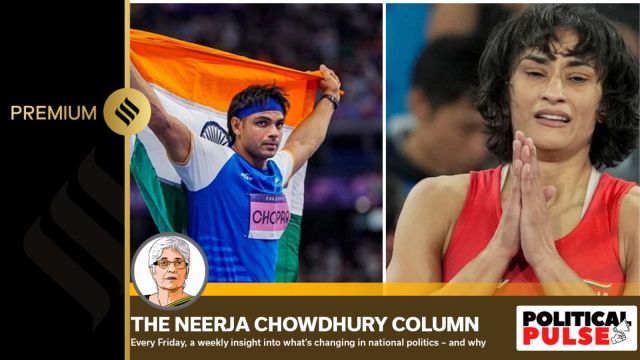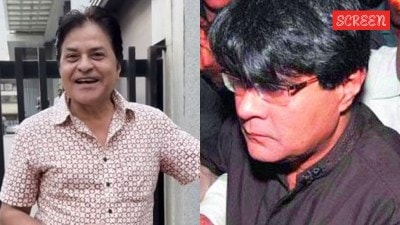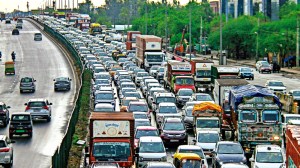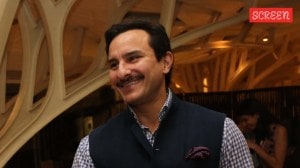From Paris Olympics, lessons for Indian politicians on both sides of the aisle
If only both sides would fight hard when required and be big-hearted when necessary — like our sportspersons — for the larger prize called our parliamentary democracy.
 India’s Tokyo gold medalist Neeraj Chopra and wrestler Vinesh Phogat. (File)
India’s Tokyo gold medalist Neeraj Chopra and wrestler Vinesh Phogat. (File)Two major events last week, India’s performance at the Paris Olympics and the political developments in Dhaka, brought home a simple message: how much our politicians could learn from our sportspersons.
When wrestler Vinesh Phogat, disqualified for being 100 grams overweight, posted her anguish on X – “everything is shattered…Goodbye wrestling 2001-2024”— Beijing Olympics gold medalist Abhinav Bindra told her: “Some (victories) end up in a cabinet (cupboard) but the ones that matter find their way into the stories we tell our children. And every child in the country will know the champion you are.”
Bindra’s words were a tribute to Vinesh’s grit, which had overcome among other things, injuries and the trauma of the battle she fought last year taking on the high and mighty, including former BJP MP Brij Bhushan Sharan Singh who the wrestlers had accused of sexual harassment. Bindra echoed what many in India felt that day. To paraphrase John Donne: “Your defeat diminishes me too.”
An ecstatic Indian hockey captain Harmanpreet Singh shared the credit of the (bronze) victory by carrying his goalkeeper P R Sreejesh on his shoulders, together accepting the fans’ euphoric acclaim.
India’s Tokyo gold medalist Neeraj Chopra, who could only win a silver at Paris this time, said: “I tried my best but Arshad Nadeem (from Pakistan who won the gold) produced an excellent throw.” Neeraj’s mother Saroj Devi echoed her son’s sentiment, “We are very happy…the one who got the gold is also like our son,” Arshad’s mother in Pakistan sent her blessings to Neeraj.
Victory or defeat, elation or depression, India’s young sportspersons reached out to others.
Politics is, of course, a different sport.
The Opposition first responded with gravitas to the situation in Bangladesh, after the sudden fall of the India-friendly Sheikh Hasina. There was concern all around that the turbulence unleashed in Bangladesh should not spill into India across the border in West Bengal or the North-eastern states of Assam, Meghalaya, Tripura and Mizoram. In the past, when less friendly governments have been in power in Dhaka, Bangladesh has been used as a sanctuary for insurgent groups.
Leader of Opposition Rahul Gandhi expressed his concern, and External Affairs Minister M S Jaishankar briefed the LoP. Even the normally feisty West Bengal Chief Minister Mamata Banerjee said she will abide by whatever decision the Central government takes on Bangladesh. The government called an all-party meeting to brief the Opposition on the situation in Bangladesh as the Congress called for a comprehensive foreign policy debate in Parliament.
Then suddenly, and curiously, came the remark from senior Congress leader Salman Khurshid — he had once headed the External Affairs Ministry — that a “Bangladesh type of situation could happen in India”.
Khurshid’s remarks struck a discordant note especially given the uncertainties in a fast-changing geopolitical scenario – more so when the need is for a responsible, restrained and unified Indian response to the developments in Bangladesh.
A word also on the spat in the Rajya Sabha between chairman Jagdeep Dhankhar and five-time SP MP Jaya Bachchan. Jaya Bachchan has a right to be addressed as she wants and she wants to be called Jaya Bachchan, not Jaya Amitabh Bachchan, which is the way the Rajya Sabha Chair addressed her on three occasions — saying this is her name in the formal papers she submitted.
The chair could have handled it with a lighter touch, instead of the angry words that followed — even as Jaya Bachchan criticised Dhankhar for his “tone” calling it “unacceptable”.
A walkout by the Opposition MPs followed, led by Sonia Gandhi; the episode seems to have brought the estranged Gandhis and Bachchans closer. That apart, the Opposition’s protests reflected their pent-up anger against the chair in both Houses for what they allege is their partisan conduct.
But for the Opposition to think of bringing an impeachment motion against the Rajya Sabha Chair, something that has not happened in independent India is again an example of going over the top.
Clearly, a strengthened Opposition won’t take things lying down. But they will have to choose their battles wisely. As for the chair, Om Birla and Jagdeep Dhankhar will have to address the sense of grievance the Opposition MPs feel, be even-handed and be seen as even-handed. If only both sides would fight hard when required and be big-hearted when necessary — like our sportspersons — for the larger prize called our parliamentary democracy.
Neerja Chowdhury, Contributing Editor, The Indian Express, has covered the last 11 Lok Sabha elections. She is the author of How Prime Ministers Decide
- 01
- 02
- 03
- 04
- 05































